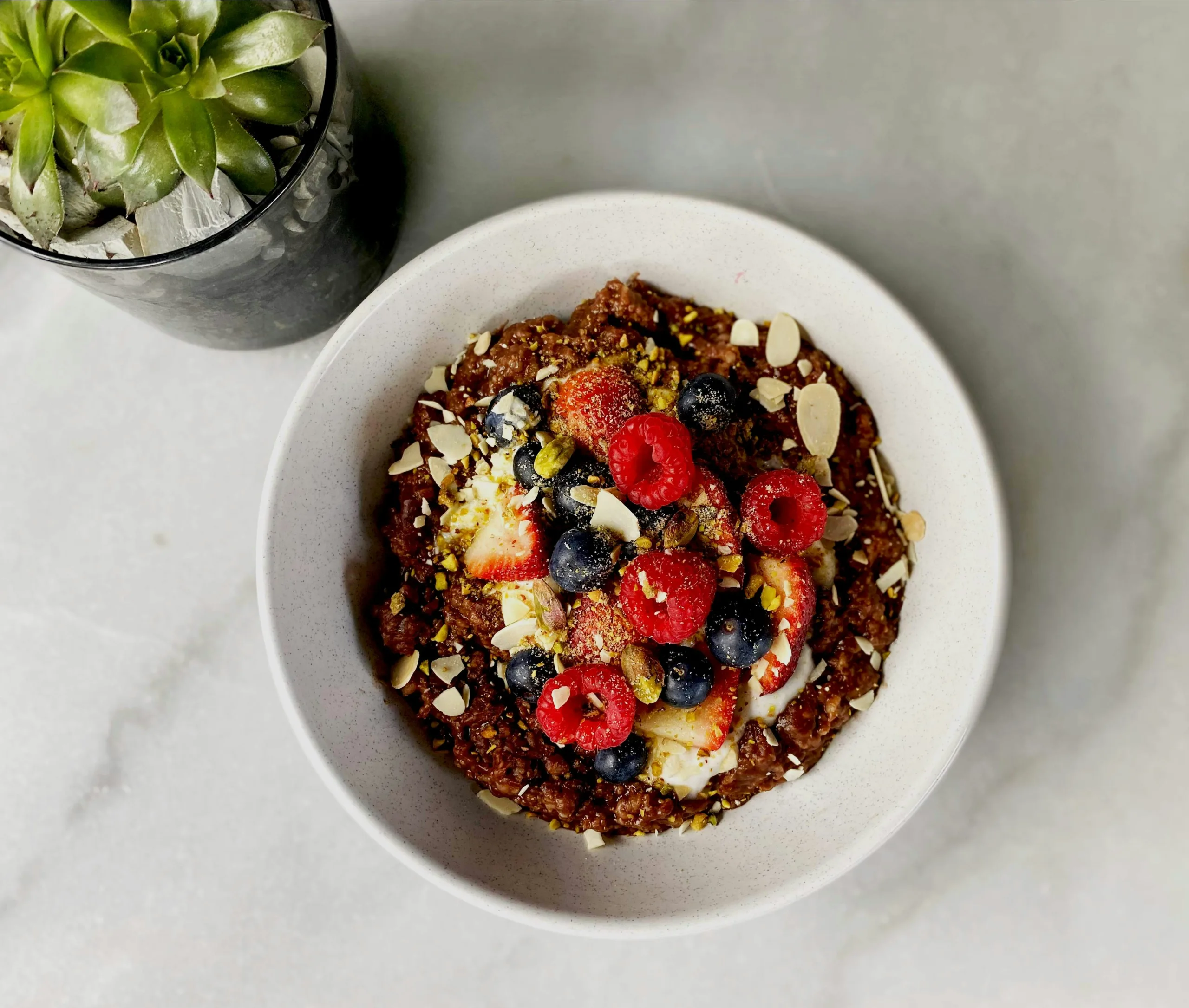When’s the last time you scraped the bottom of a yogurt container? If you answered, “Just today, actually,” then go you! But if it’s been a minute (or—gasp!—forever ago), pull up a chair and let’s have a talk.
Yogurt has had way more than 15 minutes of fame for good reason. Depending on the type you choose, yogurt is hella healthy. Plain yogurt (Greek, especially) is low in sugar and carbs, and high in protein… and that’s just the beginning.
Boo-yah! Every healthy eater’s dream!
But with all the yogurt options out there, which one should you choose? Is there a difference between Greek yogurt and regular yogurt? Is one better for you than the other? Augh! So many questions!
Don’t worry, we’re here to break it all down for you.
How They’re Made
Both Greek yogurt and regular yogurt are made from milk that’s been cultured and fermented. Admittedly, “cultured” and “fermented” sound science-y (and perhaps even a little gross), but really, it just means that bacteria are introduced to break milk sugars (lactose) down into lactic acid. This helps naturally preserve the foods, gives yogurt its tangy flavor, and introduces microorganisms your gut really loves. (More on this later.)
The difference is that Greek yogurt is put through a longer straining process than regular yogurt. Straining removes the whey (the liquid component of milk), which is how Greek yogurt gets its thicker texture. (More straining = less liquid.)
Ever wonder why you can easily pour and sometimes even drink regular yogurt, but you can’t do that with Greek yogurt? Now you know.
RELATED: 9 DIY Beauty Products You Can Make With Healthy Foods
Health Benefits of Greek Yogurt vs. Regular Yogurt
The great news is, you can’t go wrong with either yogurt. Both Greek yogurt and regular yogurt are excellent sources of magnesium, vitamin B12, and iodine.
In order for fermented milk to be called yogurt, it must contain two active cultures: Lactobacillus bulgaricus and Streptococcus thermophilus. Other bacterial cultures, such as Lactobacillus acidophilus, Lactobacillus subsp casei, and Bifido-bacteria may be added to yogurt to increase the amount of probiotics.
Probiotics, of course, are those gut-happy microorganisms we mentioned above, and they’re key players in balancing your gut microbiome. Since a healthy gut microbiome may influence everything from digestion to libido, to healthy skin and even your immunity, we say bring on those helpful bugs!
Yogurt also contains beneficial minerals like calcium, potassium, and more.
NOTE: while both are healthy, plain Greek yogurt contains fewer carbs, more protein, and less sugar than regular plain yogurt.
RELATED: Yes, You *Can* Eat Too Much Protein
How to Incorporate Yogurt into Your Diet
Yogurt is so versatile, you can use it in nearly a zillion different ways. (Okay, maybe not a zillion, but pretty close.) Here are some ideas:
Mixed with nuts, seeds, and berries for a breakfast parfait
- In place of sour cream or mayo
- As a salad or veggie bowl topping like this Herbed Yogurt Spread
- As the base of a marinade (see chicken recipe below)
- Blended into smoothies
- Frozen into popsicles (see recipe below and another one here)
- As part of a dip, sauce, or dressing like this Cilantro Lime Avocado Yogurt Dip
Keep in mind that Greek yogurt is thick and has a tangy flavor. Regular yogurt is slightly sweeter (even if it’s plain yogurt with no added sugar) and has a much thinner consistency. Also gaining popularity are Icelandic and Australian varieties, which tend to be even thicker than Greek yogurt. Those options have differing protein and fat content, depending on the brand.
Our recommendation: Go with plain Greek yogurt because of its higher protein content. If you don’t like Greek, plain regular yogurt is next best. Just be sure to choose plain vs. flavored options, since flavored options are generally high in sugar. You can always add berries, a drizzle of honey, or a healthier sugar substitute if you like a little sweetness. We also recommend choosing full-fat, organic varieties.
Greek Yogurt Recipes
Sold on the benefits of adding yogurt to your diet? Enjoy healthy flavor and Eat Empowered with a few of our favorite simple and delicious yogurt recipes.
Cucumber Feta Greek Yogurt Dip — perfect for dipping veggies or even topping chicken or a Greek-inspired salad.
Berry Homemade Popsicles — easy, healthy, and loads of fun to make with the kids. (Who needs the ice cream truck?)
Greek Yogurt Marinated Chicken — uplevel your standard grilled chicken with this marinade boasting probiotics and antioxidants.
RELATED: Cottage Cheese vs. Greek Yogurt: Which is Healthier?
Grab your spoon and get eating. Yogurt can definitely be part of your nutritious life!
Image: Shutterstock





























